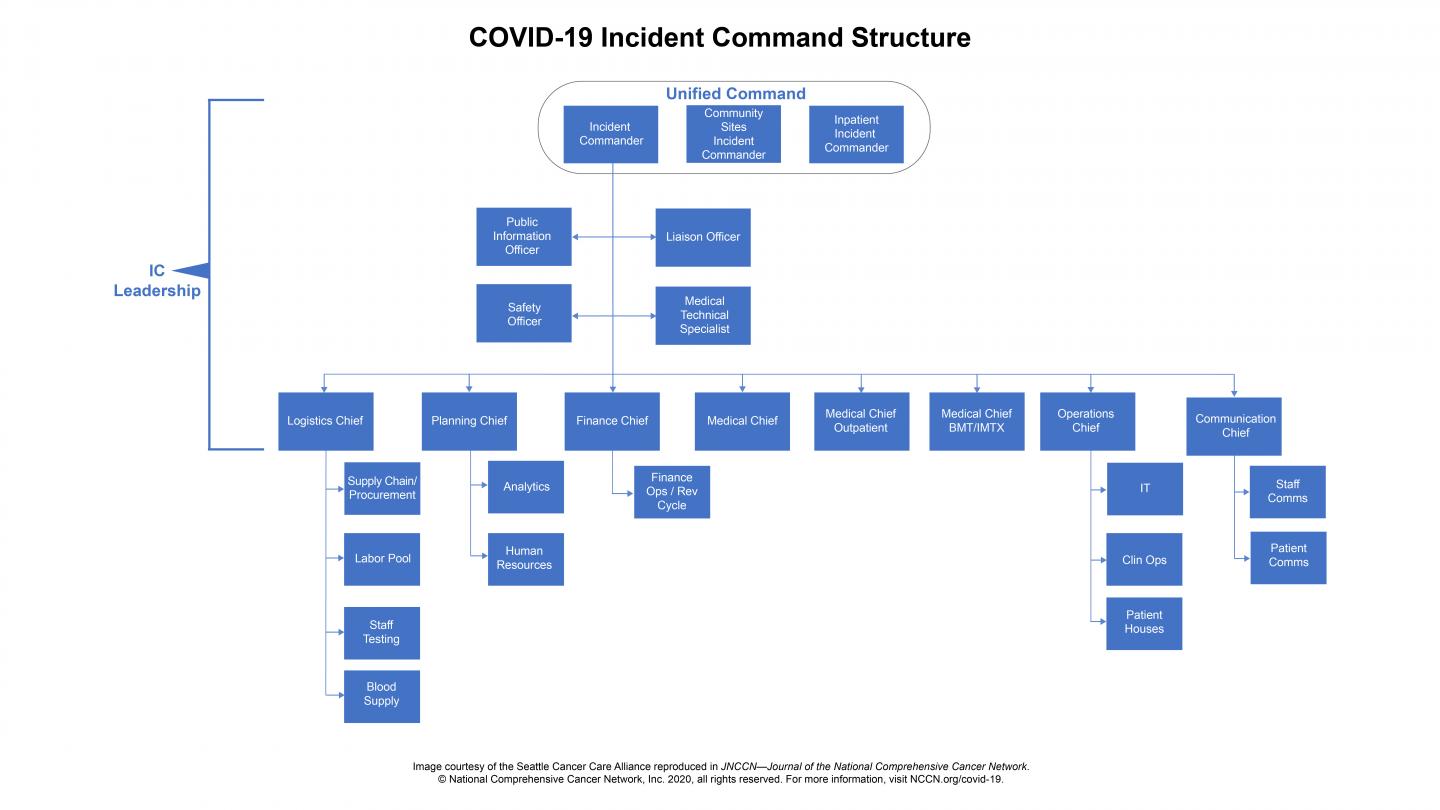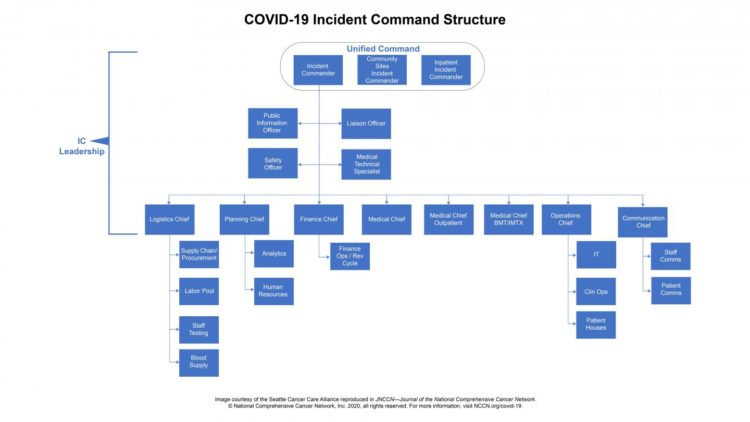Experts from Seattle Cancer Care Alliance share lessons learned from early experiences treating people with cancer during COVID-19 outbreak via free online article in JNCCN–Journal of the National Comprehensive Cancer Network

Credit: Image courtesy of the Seattle Cancer Care Alliance reproduced in JNCCN–Journal of the National Comprehensive Cancer Network.
PLYMOUTH MEETING, PA [March 18, 2020] — Experts from the Seattle Cancer Care Alliance (SCCA)—a Member Institution of the National Comprehensive Cancer Network® (NCCN®)—are sharing insights and advice on how to continue providing optimal cancer care during the novel coronavirus (COVID-19) pandemic. SCCA includes the Fred Hutchinson Cancer Research Center and the University of Washington, which are located in the epicenter of the COVID-19 outbreak in the United States. The peer-reviewed article sharing best practices is available for free online-ahead-of-print via open access at JNCCN.org.
“Responding quickly and confidently to the COVID-19 crisis is the health care challenge of our generation,” said co-lead author F. Marc Stewart, MD, Medical Director, SCCA. “Our overarching goal is to keep our cancer patients and staff safe while continuing to provide compassionate, high-quality care under circumstances we’ve never had to face before. We are working around the clock to develop new guidelines and policies to address situations that we couldn’t have imagined several weeks ago. When the pandemic ends, we will all be proud of what we did for our patients and each other in this critical moment for humanity.”
“The COVID-19 pandemic is impacting every facet of our global and domestic societies and health care systems in unprecedented fashion,” said Robert W. Carlson, MD, Chief Executive Officer, NCCN. “People with cancer appear to be at increased risk of COVID-19, and their outcomes are worse than individuals without cancer. The NCCN Member Institutions are rapidly gaining experience in preventing and managing COVID-19. As is the nature of the NCCN Member Institutions, they are sharing their experience in organizing and managing institutional and care systems responses and best practices in this rapidly evolving global effort.”
The article stresses the importance of keeping channels of communication open between administrators and staff, patients, caregivers, and the general public. The authors recommend forming an Incident Command Structure (as illustrated below) to provide early coordination of institution-wide efforts and to rapidly respond to changing information. They highlight the need to remain flexible and ready for unexpected challenges.
Some of the anticipated challenges include:
- Staff shortages due to potential exposure and/or school closings
- Limitations of resources such as hospital beds, mechanical ventilation, and other equipment
- Impact on treatment from travel bans, including reduced access to international donors for allogeneic stem cell transplantation
The authors recommend mitigating some of these concerns through proactive measures that include:
- Providing patient information via handouts, signs, web-based communication, and a dedicated phone line for questions and triage
- Rescheduling “well” visits and elective surgeries, and deferring second opinion consultations (where care is already appropriately established)
- Increasing hours of general hospital operations to reduce the unnecessary use of emergency department resources
- Reinforcing a strict “stay at home when ill” policy and insuring staff have access to testing
- Restricting travel and enabling work-from-home wherever possible
- Prioritizing the use of soap and water over hand gel
- Limiting the number of team members who enter patients’ rooms
- Considering lower thresholds for blood transfusions
- Moving some procedures from inpatient to outpatient
- Adopting a no visitor policy with rare exceptions such as end-of-life circumstances
- Having upfront, proactive palliative and end-of-life conversations with cancer patients who may become infected with COVID-19
The article also addresses the importance of self-care within and beyond the medical community. The authors call for the prioritization of measures to protect health and frontline staff and assure a safe work environment in order to prevent provider burnout. Those measures include compensation policies, reassignments to administrative roles for immunocompromised staff, and the creation of a back-up labor pool.
NCCN is also gathering documents and links from the leading cancer centers that comprise the nonprofit alliance, and sharing them all online at NCCN.org/covid-19. These include print outs for patient information, screening tools, visitation policies, and other essential forms. Hospitals worldwide are free to use or adapt these resources immediately. The site will be continuously updated as new resources become available.
The entire article can be read at jnccn.org/fileasset/jnccn1804-Ueda_20118_preprint.pdf, or via a link at NCCN.org/covid-19.
# # #
About the National Comprehensive Cancer Network
The National Comprehensive Cancer Network® (NCCN®) is a not-for-profit alliance of 28 leading cancer centers devoted to patient care, research, and education. NCCN is dedicated to improving and facilitating quality, effective, efficient, and accessible cancer care so patients can live better lives. Through the leadership and expertise of clinical professionals at NCCN Member Institutions, NCCN develops resources that present valuable information to the numerous stakeholders in the health care delivery system. By defining and advancing high-quality cancer care, NCCN promotes the importance of continuous quality improvement and recognizes the significance of creating clinical practice guidelines appropriate for use by patients, clinicians, and other health care decision-makers around the world.
Media Contact
Rachel Darwin
[email protected]
267-622-6624
Original Source
http://www.
Related Journal Article
http://dx.





